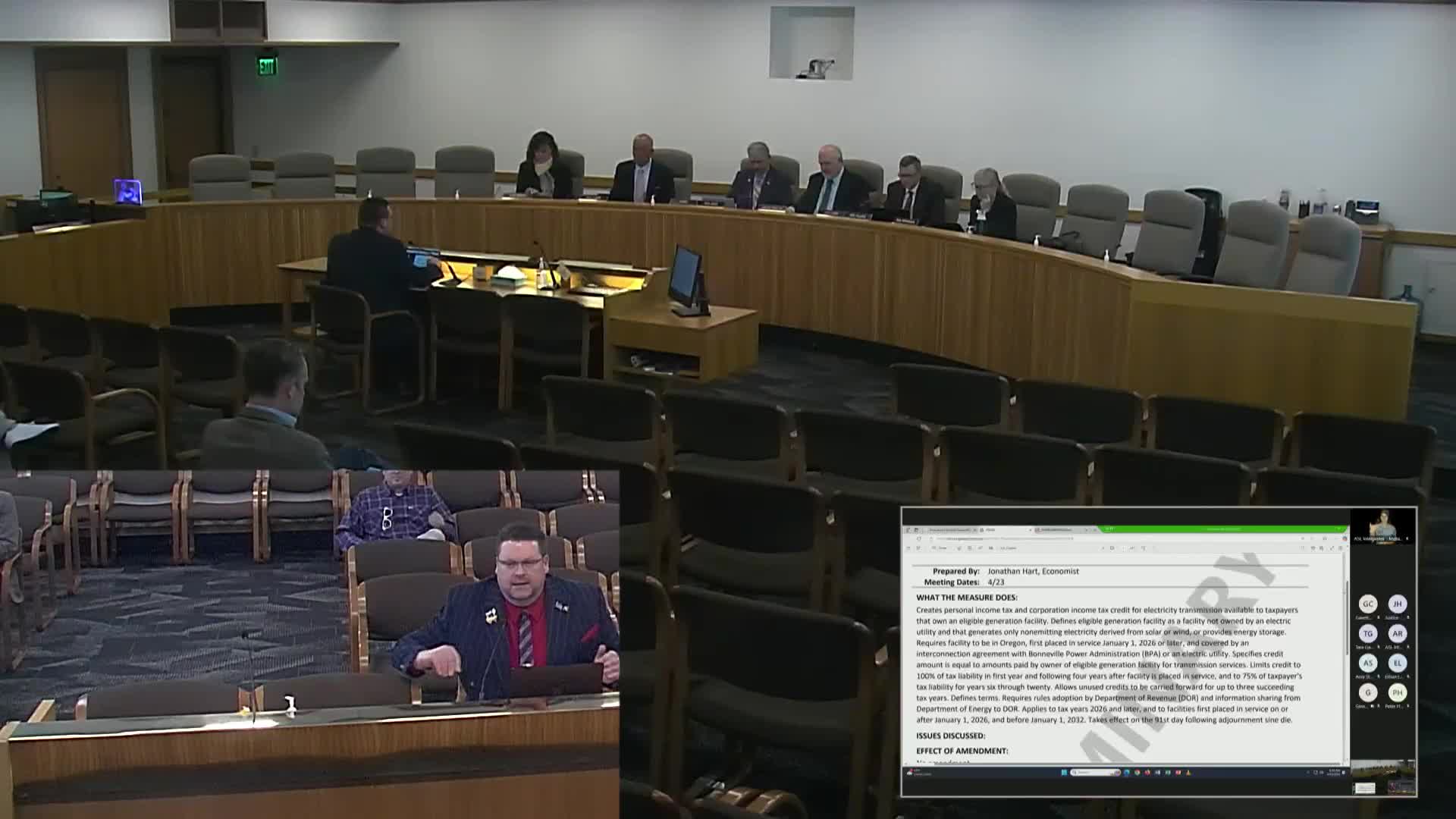Senate committee hears public testimony on bill to credit transmission costs for in‑state solar, wind and storage projects
Get AI-powered insights, summaries, and transcripts
Subscribe
Summary
Senate Bill 927 would create personal and corporate income tax credits to offset "wheeling" (transmission) charges for non‑emitting electricity from solar, wind and energy storage; sponsors and industry witnesses said the credit would spur rural projects, jobs and local tax revenue, while staff signaled a technical amendment is being negotiated.
Senate Committee on Finance and Revenue Chair Mark Meek opened a public hearing April 23 on Senate Bill 927, a proposal to create a personal income tax and corporate income tax credit to offset transmission ("wheeling") charges for electricity from solar, wind and energy storage placed in service after Jan. 1, 2026 and before Jan. 1, 2032.
Sen. David Brock Smith, sponsor of SB 927, told the committee the credit is intended to "remove major barriers to the solar and battery storage by addressing wheeling charges that make renewable energy less competitive," and said the measure would support rural economic development and local construction and maintenance jobs in parts of his district.
"This wheeling relief will improve grid resiliency. It's an urgent public‑safety issue as far as I'm concerned when we talk about wildfire," Brock Smith said. He also cited local storms and outages on the coast and described battery storage as "critically needed."
Gina Franzosa, representing the Oregon Clean Competitive Power Alliance, testified in support and described wheeling as "another word for energy transmission," explaining wheeling fees are charged each time power is conveyed along different transmission owners' facilities. "Projects that must bear the cost of more than two wheels often do not pencil or are simply less financially attractive and do not get built," Franzosa said. She said Oregon currently imports more than one‑third of its electricity and that in‑state projects produce jobs, property tax revenue and opportunities for community investments such as a specialty clinic in Harney County.
Franzosa gave numeric examples: she said Sherman County receives roughly $7,000,000 in property tax revenue from renewables, about one‑third of the county's base, and described a project whose estimated Bonneville Power Administration interconnection cost rose from $2,000,000 five years ago to $7,000,000 today, stalling development.
Ryan Tribbett — who told the committee he has been working with the Department of Revenue and Department of Energy on technical drafting — said agency review and certification would likely be part of an amendment. He described a common administration pattern: an energy review agency certifies qualifying expenditures and provides a certificate to the Department of Revenue, which would then determine eligibility and tax treatment, including carryforward rules.
Angela Crowley Cook, executive director of the Oregon Solar and Storage Industries Association, said the lack of a regional transmission organization (RTO) in the West leaves Oregon with inconsistent wheeling charges. She also relayed industry news that countries producing a large share of solar panels face newly finalized tariffs and said the industry is facing near‑term cost pressures.
Committee members asked whether a separate bill to create a regional transmission authority is moving through the Legislature; witnesses said a House study bill or related proposals are in play but that RTO membership decisions are complex and likely years away.
No committee vote was taken; the hearing record will be available as staff and sponsors continue to negotiate technical amendments with state agencies. Chair Meek closed the public hearing and moved on to subsequent informational presentations.
Why it matters: Witnesses and the sponsor framed SB 927 as a targeted economic development and grid‑resiliency tool to make in‑state renewables more competitive against out‑of‑state projects, with examples of lost projects and rising transmission costs used to justify the incentive. The bill, as introduced, sets a clearly limited in‑service window and relies on tax‑credit mechanics that would require agency certification and administrative rules.
Votes/Next steps: Public hearing only; no committee action recorded. Sponsors and industry witnesses said they expect to return with a technical amendment negotiated with the Department of Energy and Department of Revenue.
